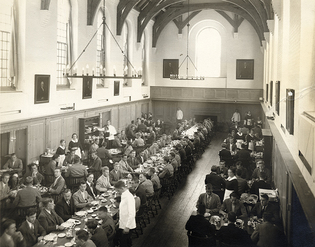 loading
loading
Old YaleUncommon leadershipWhen Yale dining was in trouble, Cora Colburn was the answer. Judith Ann Schiff is chief research archivist at the Yale University Library.  Manuscripts & ArchivesThe Timothy Dwight College dining hall in 1935–36. Cora Colburn oversaw Yale’s dining halls for 16 years and was involved in the planning of the residential colleges. View full imageOn March 28, 1923, Yale president James Rowland Angell wrote to Miss Cora C. Colburn in Chicago with a cry for help for the university dining hall: “We are in trouble here at Yale over our Commons.” In 1921, the Yale trustees had elected Angell, the first president since 1766 who was not a Yale graduate, to reorganize the university in the postwar age of science and secularization. Among the many challenges Angell faced was the dysfunction of the dining hall, which was serving below its capacity and running a deficit. From the boarders, there were complaints about the quality, quantity, and price. In addition, they had to tip the “table runners,” usually poor students who served at low wages. Many students instead patronized eating clubs managed by students and professionals. With only 700 regulars, Commons was even forced to close for the 1920–21 school year. In the fall of 1922, when the Sheffield Scientific School merged with Yale College, all freshmen were required to eat their meals in Commons. For a year, the dining hall was managed with a continuing deficit by Burton G. Kellogg ’20, with many complaints by students and by parents with health concerns. But in Colburn, Angell was confident that he had found the best person in America to feed Yale tastefully, hygienically, and economically. She had greatly impressed Angell during his years as a professor of psychology at the University of Chicago, where she was head of institution economics and director of the commons. Colburn had devoted her life to improving institutional nutrition and food service since attending Oberlin College. She had taught at Simmons and undertook special projects at MIT, Columbia, and Vassar prior to her appointment at Chicago in 1910. After receiving Angell’s letter and visiting New Haven, she agreed to become acting director of the university dining halls for 1923–24. That year was a great success. Some of it was due to moderating the requirements for freshmen; they no longer had to remain in assigned seats and could organize tables in club groups of 8 to 12, and Sunday dining became optional. In addition, Angell decided to eliminate competition by no longer renting nearby Yale properties to private restaurants. After the year at Yale, Colburn returned to Chicago for another year, then came back to Yale as director. Her appointment at Yale in 1926 was at the rank of professor, and she was awarded an honorary MA in 1927—only the second Yale professional staff woman to receive one. (The first was consulting landscape gardener Beatrix Farrand, in 1925.) Angell appreciated Colburn’s talents and sought to keep her happy. “We have had to shut the Hall up several times because of inability to secure persons who could run it satisfactorily, and this might well happen again if Miss Colburn were to give up the job,” he wrote to the associate director of the Bureau of Appointments. “As you are well aware, she will run it on her own lines or not run it at all.” Colburn was responsible for residential college dining from the beginning of planning for the colleges in 1929. As the residential college dining halls grew from five to nine, Colburn met the challenge, serving 1,600,000 meals in 12 dining halls in 1938. It was a great shock to the Yale community when she died suddenly in her office in the university dining hall on October 2, 1939, at the age of 72. For 16 years, she had modernized and improved Yale dining. The New York Times, in her obituary, called her “one of the foremost designers of equipment for cooking and serving of food.” Professional women rarely received a Times obituary in that era, but as the Times wrote, Colburn was “nationally known.”
The comment period has expired.
|
|